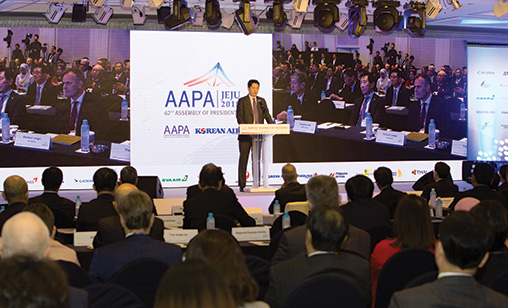Main Story
The beating heart of the region’s airline issues
November 1st 2018
The Association of Asia-Pacific Airlines (AAPA) 62nd Assembly of Presidents strengthened the resolve of its members to be a strong voice in shaping global industry perspectives on safety, emissions reduction progress, expansion of infrastructure and airline passenger rights. Read More »
Its members also recognized in their assembly resolutions the new challenges of recruiting and training sufficient engineers and pilots to crew and maintain their expanding fleets and the social obligation to go beyond traditional parameters to assist in combating wildlife trafficking.
 |
AIRLINE SAFETY
Safety performance can be enhanced with the implementation of the International Civil Aviation Organisation (ICAO) Annex 19 “Safety Management”. AAPA urged governments and industry to establish regional and national safety teams, support voluntary reporting of safety incidents and events and establish mutual trust based on “Just Culture” principles.
EMISSIONS REDUCTIONS
AAPA leaders urged governments and airlines to work together to ensure the effective implementation of the Carbon Offsetting and Reduction Scheme for International Aviation (CORSIA) ) and refrain from the introduction of duplicate requirements on international aviation CO2 emissions.
The AAPA encouraged the ICAO Council to finalize its guidance on the CORSIA Emissions Unit Criteria so airlines could have broad access to recognized carbon offsets.
AIRPORT INFRASTRUCTURE
Governments should ensure regulatory frameworks for airport infrastructure investment are fit for purpose and properly balance the interests of airlines, passengers and airport operators.They also should adhere to the principles of non-discrimination and transparency of user charges in line with ICAO guidance.
PASSENGER RIGHTS
The air transport industry is extremely complicated with governments, regulatory agencies, airlines, infrastructure operators and other service providers working closely to ensure coherent systems operations.
Many governments have introduced, or are proposing to introduce, aviation specific consumer protection regimes. These actions can be uncoordinated and inconsistent with existing international treaties and can confuse consumers. They also result in operational difficulties for airlines. The AAPA assembly asks governments to ensure mandated regulations for consumer protection are non-prescriptive, practical and cost-effective.
AVIATION MANPOWER
ICAO has forecast the aviation sector will require 620,000 pilots, 1.3 million aircraft maintenance personnel and 125,000 air traffic controllers in the next 20 years. AAPA asked governments to support ICAO’s plan for more education and aviation training and stressed the airline industry’s commitment to improving workplace diversity in the industry.
WILDLIFE TRAFFICKING
The illegal trade in wildlife and wildlife products increasingly threatens the survival of endangered species. Criminal syndicates are exploiting the connectivity of the air transport industry to traffic wildlife and wildlife products worldwide.
Airlines recognize that by collaborating with governments, law enforcement agencies, airports and freight forwarders they can help contain this multi-billion dollar global industry, but said governments must increase their investments in manpower and technology if the fight against illegal animal trafficking is to be won.